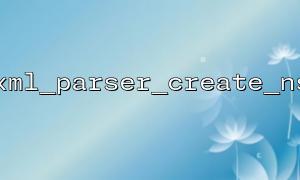When using PHP to handle XML data, xml_parser_create_ns is a commonly used function that creates an XML parser with namespace support. However, many developers are uncertain about the range of character encodings supported by the function and how to correctly handle UTF-8 and other encoding formats. This article will provide a detailed introduction to the encoding types supported by this function and explore the key considerations when processing XML data in different encodings.
The prototype of the xml_parser_create_ns function is as follows:
<span><span>resource </span><span><span class="hljs-title function_ invoke__">xml_parser_create_ns</span></span><span> ([ </span><span><span class="hljs-keyword">string</span></span><span> </span><span><span class="hljs-variable">$encoding</span></span><span> ] )
</span></span>In this function, the $encoding parameter is optional and specifies the character encoding for the parser. If this parameter is not explicitly passed, the parser will use the system's default encoding, which is typically UTF-8.
The function supports the following character encodings:
UTF-8: The default and preferred encoding.
ISO-8859-1: A common encoding for Western European languages, also known as Latin-1.
US-ASCII: Basic ASCII encoding, supporting characters in the range of 0–127.
It is important to note that these encodings are supported by the underlying Expat XML parser, which PHP's XML parsing functionality is based on. Therefore, the encoding support is limited to the capabilities of Expat.
UTF-8 is the most commonly used character encoding in modern applications due to its excellent compatibility and internationalization features. When using xml_parser_create_ns, the parser is created in UTF-8 mode by default, so developers do not need to set anything extra. However, when handling XML files encoded in UTF-8, the following points should be ensured:
The XML file must be saved in UTF-8 encoding, and the XML declaration header should specify the encoding:
<span><span><span class="hljs-meta"><?xml version=<span class="hljs-string">"1.0"</span></span></span><span> encoding=</span><span><span class="hljs-string">"UTF-8"</span></span><span>?>
</span></span>The PHP script itself should be saved as UTF-8, especially when processing CDATA or directly outputting node content, to avoid encoding issues.
Ensure that the input stream is not incorrectly converted by other systems, such as when retrieving XML data from an HTTP interface, where encoding mismatches in headers can lead to parsing failures.
When the XML file is not encoded in UTF-8 but rather in ISO-8859-1 or US-ASCII or another encoding format, the parser can be created by passing the corresponding $encoding parameter. For example:
<span><span><span class="hljs-variable">$parser</span></span><span> = </span><span><span class="hljs-title function_ invoke__">xml_parser_create_ns</span></span><span>(</span><span><span class="hljs-string">"ISO-8859-1"</span></span><span>);
</span></span>In addition, when parsing XML files with non-UTF-8 encoding, the following considerations should be kept in mind:
Ensure that the encoding declared in the XML declaration matches the actual content;
If possible, convert the XML file to UTF-8 before parsing, as this simplifies the encoding handling process;
Avoid mixing character set functions between different encodings, such as iconv() or mb_convert_encoding(). Ensure the content is converted to the correct encoding before parsing.
xml_parser_create_ns primarily supports UTF-8, ISO-8859-1, and US-ASCII encodings. For most modern applications, it is recommended to always use UTF-8 encoding, as it simplifies the processing flow and enhances compatibility and internationalization. When handling XML files in non-UTF-8 encodings, you can ensure accurate parsing by passing the correct encoding parameter or by converting the encoding beforehand. Understanding the role of encoding and the behavior of the parser is essential for building stable and reliable XML processing systems.




